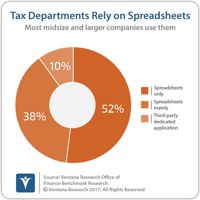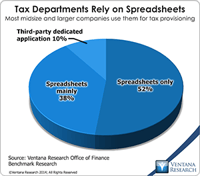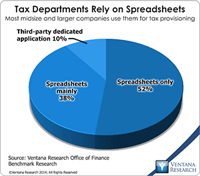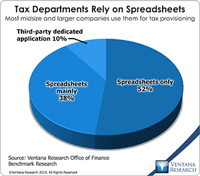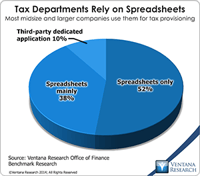In 2013, the Organization for Economic Cooperation and Development (OECD) published a report titled “Action Plan on Base Erosion and Profit Shifting” (commonly referred to as “BEPS”), which describes the challenges national governments face in enforcing taxation in an increasingly global environment with a growing share of digital commerce. Country-by-country (CbC) Reporting has developed in response to the concerns raised in the report. To date, 65 countries (including all members of the...
Read More
Topics:
ERP,
GRC,
audit,
finance transformation,
LongView,
Tax,
Business Analytics,
Oracle,
CFO,
Vertex,
FPM,
BEPS,
tax department,
tax planning
The steady march of technology’s ability to handle ever more complicated tasks has been a constant since the beginning of the information age in the 1950s. Initially, computers in business were used to automate simple clerical functions, but as systems have become more capable, information technology has been able to substitute for increasingly higher levels of human skill and experience. A turning point of sorts was reached in the 1990s when ERP, business intelligence and business process...
Read More
Topics:
Sustainability,
ERP,
Governance,
GRC,
Human Capital,
Office of Finance,
audit,
finance transformation,
LongView,
Tax,
Analytics,
Business Analytics,
Business Performance,
Financial Performance,
Oracle,
CFO,
Risk & Compliance (GRC),
Vertex,
FPM,
Innovation Awards,
Thomson-Reuters multinational
Longview’s recent Dialog user group meeting highlighted the company’s continued commitment to providing much needed automation tools for improving tax department performance – tools that enable the tax function to play a more strategic role in the management of a company. The sessions also covered the capabilities contained in the company’s latest release, Longview 7.2 Update 2 and gave customers a detailed product evolution roadmap following their merger with arcplan.
Read More
Topics:
Big Data,
LongView,
Analytics,
Business Performance,
Financial Performance
One of the issues in handling the tax function in business, especially where it involves direct (income) taxes, is the technical expertise required. At the more senior levels, practitioners must be knowledgeable about accounting and tax law. In multinational corporations, understanding differences between accounting and legal structures in various localities and their effects on tax liabilities requires more knowledge. Yet when I began to study the structures of corporate tax departments, I was...
Read More
Topics:
Big Data,
ERP,
Governance,
GRC,
Office of Finance,
audit,
finance transformation,
LongView,
Tax,
Analytics,
Business Analytics,
Business Performance,
Financial Performance,
Information Management,
Oracle,
CFO,
Risk & Compliance (GRC),
Vertex,
FPM,
Innovation Awards,
Thomson-Reuters multinational
I’ve written before about the increasing importance of having a solid technology base for a company’s tax function, and it’s important enough for me to revisit the topic. Tax departments are entrusted with a highly sensitive and essential task in their companies. Taxes usually are the second largest corporate expense, after salaries and wages. Failure to understand this liability is expensive – either because taxes are overpaid or because of fines and interest levied for underpayment. Moreover,...
Read More
Topics:
ERP,
Governance,
GRC,
Office of Finance,
audit,
finance transformation,
LongView,
Tax,
Analytics,
Business Analytics,
Business Intelligence,
Business Performance,
Financial Performance,
Information Management,
Oracle,
CFO,
Risk & Compliance (GRC),
Vertex,
FPM,
Innovation Awards,
Thomson-Reuters multinational
Longview Solutions has a longstanding presence in the financial performance management (FPM) software market and was rated a Hot vendor in our most recent FPM Value Index. Several years ago it began offering a tax provision and planning application. I think it’s worthwhile to focus on the tax category because it’s less well known than others in finance and is an engine of growth for Longview. We expect larger corporations increasingly to adopt software to manage direct (income) taxes to improve...
Read More
Topics:
ERP,
GRC,
Office of Finance,
audit,
finance transformation,
LongView,
Tax,
Analytics,
Business Analytics,
Business Performance,
Financial Performance,
Governance, Risk & Compliance (GRC),
CFO,
FPM,
Innovation Awards
With its FXR offering, Longview Solutions becomes the latest entrant into the market for software that automates the close-to-report cycle. Addressing the steps in the accounting cycle after the books are closed, the product assembles this accounting data, data from other sources (for example, management data such as a business segment breakout of revenues and operating profits or nonaccounting data such as the amount of real estate owned or leased), and the written commentary that accompanies...
Read More
Topics:
Financial Close,
LongView,
Business Performance,
Financial Performance,
Workforce Performance,
Financial Performance Management
